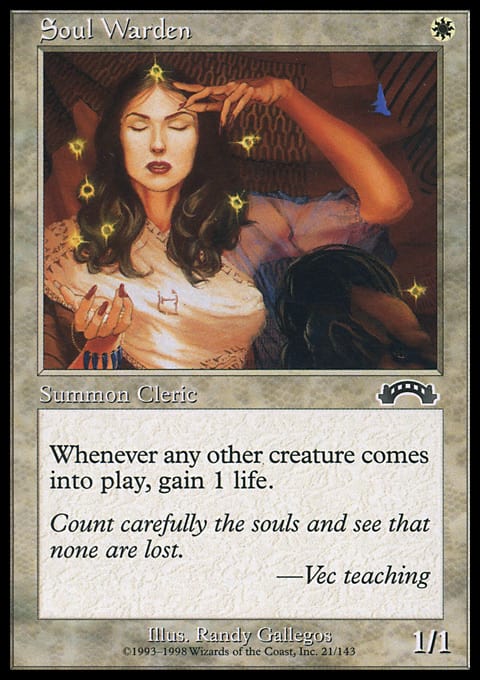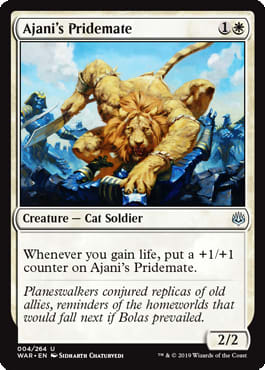Magic has myriad colloquialisms that worm their way into our consciousness over years of playing this game. Many are straightforward, others a bit more oblique - who among us hasn't caught ourselves mindlessly slipping phrases like "never didn't have it" and "heart of the cards" into everyday non-Magic conversations?
But the other day one of those iconic Magic turns of phrase got stuck in my head like a bad pop song. "Threat assessment." It's part of the very fabric of Commander and its multiplayer nature. We commonly think of threat assessment as the process by which we determine the opponent we should try to eliminate first.
Except now, after sitting with that earworm for days... I think we've been wrong about what "threat assessment" really means or, rather, what it should mean to Commander players.
Stand Down Red Alert
Every playgroup has the person or persons who catch all kinds of flak for being terrible at threat assessment. In virtually every playgroup of which I have ever been a part, it's been me. You know the type. Someone else attacks us first for one damage? I MUST END YOU. "You know, Johnny has us in a real tough lock with all those enchantments, but IF Laura draws a board wipe AND she casts it on the next turn, but not the turn after that, AND if she activates Ral Zarek's ultimate AND all the coin flips come up heads, we're really going to be in trouble, so clearly I must swing at Laura for 38."
Sigh. I'm in this picture and I don't like it.
For years, I've struggled to figure out why I had such a hard time assessing threats in a Commander game. I'm a bright guy, I figured, I don't get emotional and reactionary. (Of course I do, I'm human.) I can tell when someone's deck is ready to pop off. (I subconsciously decided to go after them the moment they told us which deck they were playing.) Sometimes the best threat removal is player removal. (That one's true, but it's also a crutch, and we'll get to that later.)
The more I noodled on this, the more frustrated I became until finally, randomly, it hit me.
The problem with the commonly-held notion of threat assessment in Commander is that we think of players as threats, and our objective then is to remove that player from the game altogether. The truth is that, far more often than not, the threat is something far narrower - a specific card or set of cards. These are problems to be solved, and in most cases they can be solved without eliminating an opponent.
That's where the disconnect always came in for me, I've realized. We've become conditioned to play in such a way that not only must we deal with the problem on the board by getting rid of or otherwise neutralizing the cards themselves, we must also punish the player by knocking them out.
And that, I now understand, is where my bad feelings about my threat assessment came in. Whether I was the victim or the perpetrator, I could recall far too many Commander games in which we ended up playing Archenemy when it really wasn't necessary. I'm not sure what makes me feel worse, in retrospect - all the times I was hated out of a game because I was perceived, correctly or otherwise, as the threat, or the many times I did that to someone else.
I'm done with that. From here on out, I no longer deal in "threat assessment". I'm all in on "problem assessment".
Cards Are Problems, People Aren't*
I don't play Commander to win. Not exclusively. Sure, it's always satisfying to have my deck do what I built it to do and have that result in a victory. But ultimately, I don't consider a game a failure just because I lost, and it's not a success just because I won, either. I've won - and lost - plenty of games I'll never remember. What I do hold onto are the memories of how those games played out. The social interactions we share in a Commander game mean far more to me than who winds up being the last one standing.
So, by that logic, I believe that winning a game by ruining someone else's good time is no victory at all. But that line of thinking is only as effective as each player's commitment to it. It's part of the social contract that is fundamental to Commander as a social format first and foremost.
All of this is nice for me to say in an article, but we're all human, and when the game actually begins it becomes far too tempting for our very human competitive instincts to take over. As lands and permanents hit the battlefield, as spells are countered and cards drawn, we routinely lose sight of the bigger picture. We forget that we came to have a positive social experience against the backdrop of a card game - not to win a card game at any cost.
At this point, I'm quite sure some of you are asking, "So, you're saying I should let myself be beaten?" No. Not even a little bit. I'm saying this is a format in which winning does not come first for the bulk of its players. This is not a cutthroat format. There is nothing on the line, no stakes, no prizes to be won - and, therefore, I believe strongly that winning a game of Commander is not a prize unto itself.
You may also be thinking, "Well, someone has to win!" And that's true. Each game does need to end. Each game has a point at which everyone sort of comes to the unspoken understanding that it's time for players to start being eliminated. I'm talking about everything that happens leading up to that. I'm talking about the things we do, and more importantly, the way we do them, when the game is still in its early stages.
Let's look at an example. You and I and two of our friends are playing Commander. I'm using my trusty Daxos, Blessed by the Sun deck. As I always do, I reiterate before the game that the deck wants to gain a lot of life and then see what happens. The life can't be weaponized into player removal because there's no Aetherflux Reservoir, and it can't cheaply win me the game on turn four or five because there's no Felidar Sovereign.
Here's my turn one play:
On turn two, my battlefield looks like this:
And now it's turn three:
I had this exact sequence play out in a game recently. It was right about at this point that I heard someone say, "Well, Dave is the threat."
I really, truly, madly, deeply was not. Taken together my cards represented a problem, but the only thing I was "threatening" to do was gain more life I couldn't use as a resource in any appreciable way. It was easy enough to solve the problem - remove the cards, attack me a bit and knock that life total down a few pegs. On this day, my opponents didn't team up to make me the Archenemy and eliminate me early, which has certainly happened to me - and probably to you - before.
On this day, my opponents recognized what I hadn't yet been able to articulate - that cards are problems, players are not. (If you have a player at your table who is a problem as a person - they're being hateful or mean or offensive or otherwise intentionally detrimental to the game - you don't remove them in the game, you tell them to get the hell away from your table.)
The shift in thinking that's required here is subtle but significant. It's a matter of looking at a problem on the board - like my battlefield from earlier - and saying, either internally or out loud, "That's the problem we need to fix" instead of, "That's the player we need to eliminate."
Then comes the most important part and perhaps the biggest change in thinking we all could stand to make: Once the problem is solved, leave the player alone. That means no more, "Well, sure, we wiped the board and killed his creatures and exiled her enchantments but they could be a threat again soon!"
What I've realized, and what compelled me to write this article, is that when we continue to punish players long after we've solved their problems, it's tantamount to bullying. I'd wager that's not how we intend it to come across, but the result is the same. Think about how many times you've had your board wiped, or been taken down to a perilously low life total, and still heard your opponents talking about how they needed to finish you off just in case. Or, even worse, the table knocks someone out very early in the game, forcing them to sit there and watch while everyone else keeps playing.
Doesn't feel great to be that person. And it shouldn't feel great to be the ones doing that to someone else.
As is always true in Commander, different playgroups have fun in different ways. If you and your friends all enjoy being ruthless - in a playful way, one hopes - to each other, then go to town. What I'm asking is, yet again, for Commander players to read the room. Be mindful of what they're saying, how they're saying it and whether their mood has darkened. Remind yourself that your fun doesn't have to come at the expense of someone else's. We can, do and always should strive to have fun playing Commander without making someone else miserable.
This is a game of people played with cards. A game of people. People aren't threats because there's nothing to threaten. It doesn't matter who wins and loses, it matters how everyone feels walking away from the table. Losing sight of that and ruining someone's day in the process is the real threat.
You might have clicked on this article expecting to find advice for how to tell which opponent to target or how to keep the target off your own back. Instead, I'm asking everyone - my flawed human self included - to get words like "target" and "threat" out of our collective vocabulary.
Cards are problems, people are not. Deal with the cards then let the people keep playing.
Simple.
Dave is a Commander player currently residing in Reno, NV. When he's not badly misplaying his decks, he works as a personal trainer. You can bother him on Twitter and check out his Twitch channel.



























